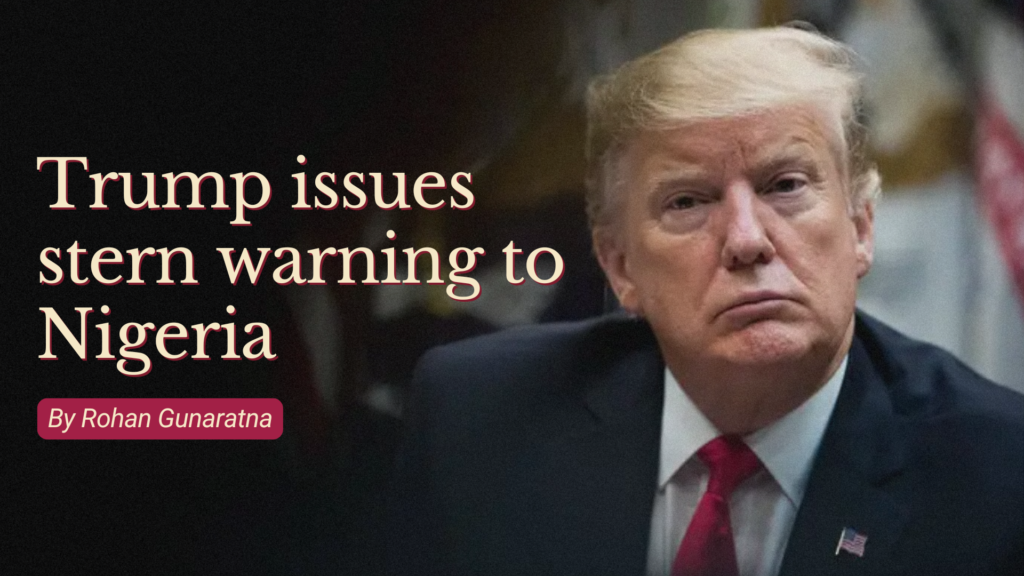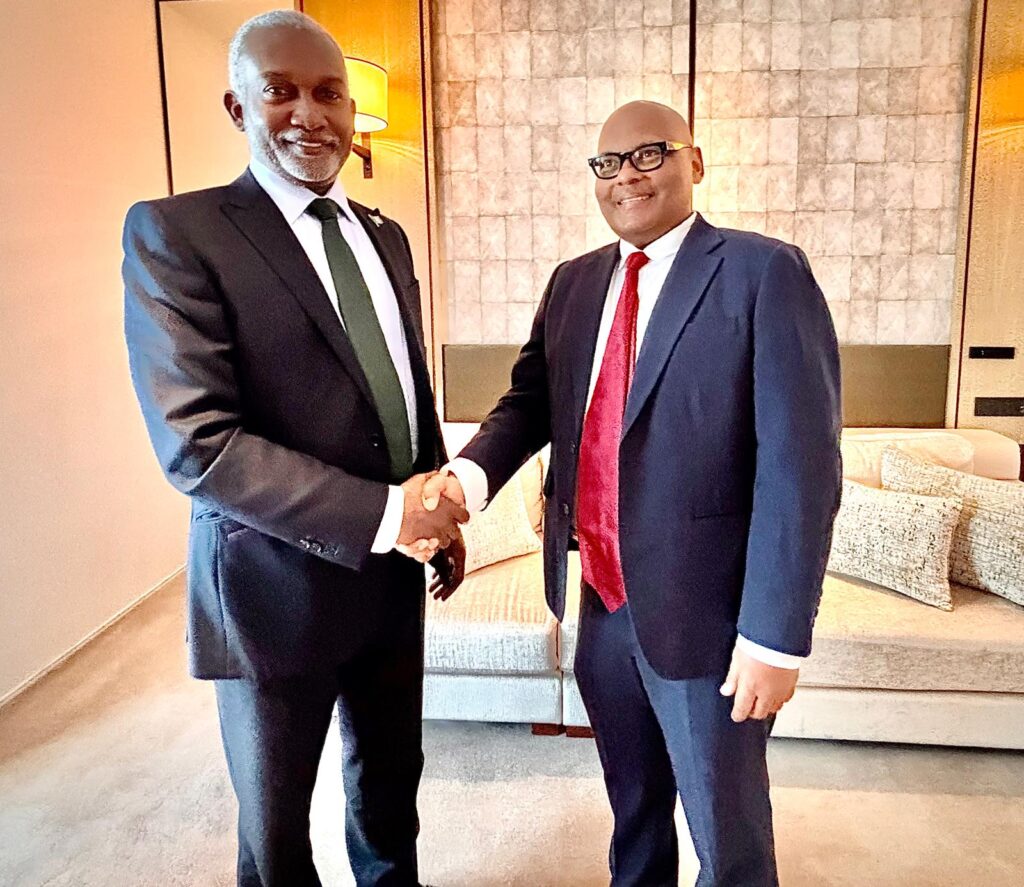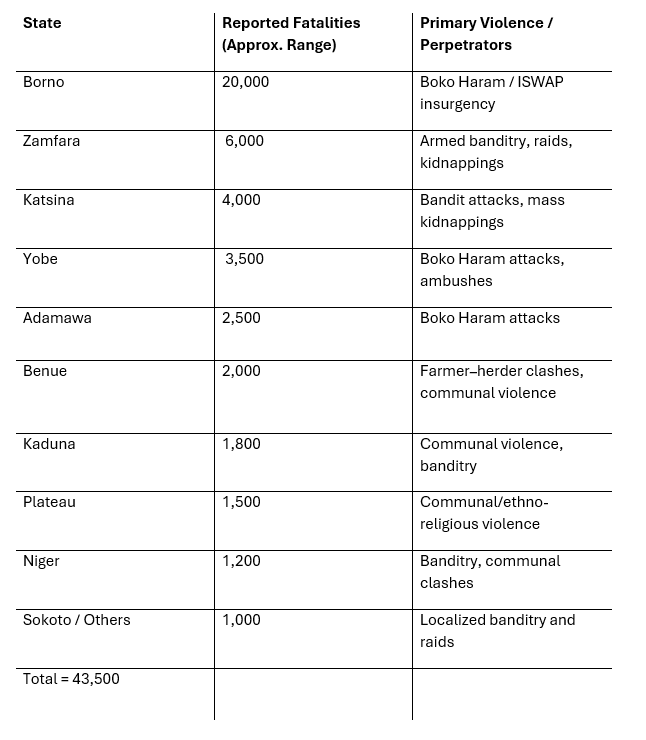
By Rohan Gunaratna
Introduction
On November 2, 2025, the US President Donald J. Trump announced that he instructed the US Department of War to prepare for attacks in Nigeria – “if the Nigerian government continues to allow the murder of Christians.” Trump also said that the administration is halting all economic aid to Nigeria.
With Trump’s comments, the world’s spotlight is now focused on the neglected continent of Africa. Trump said, “If the Nigerian Government continues to allow the killing of Christians, the U.S.A. will immediately stop all aid and assistance to Nigeria, and may very well go into that now disgraced country, ‘guns-a-blazing,’ to completely wipe out the Islamic Terrorists who are committing these horrible atrocities.”
Having myself conducted extensive research in Nigeria and many other countries engulfed by terrorism in Africa, I urge the Nigerian government and other governments in Africa to take Trump’s comments seriously.
Trump said he has directed Rep. Riley Moore, R-W. Va., Rep. Tom Cole, R-Okla., and members of the House Appropriations Committee to investigate the situation and report their findings to him. “The United States cannot stand by while such atrocities are happening in Nigeria, and numerous other countries,” Trump said, adding. “We stand ready, willing, and able to save our Great Christian population around the World!”
The US designated Nigeria as a “country of particular concern” after the violence in Nigeria has reached an alarming level. Entire villages have been burned to the ground, worshipers killed during Sunday services, and thousands displaced by Islamist groups sweeping through the country’s northern and central regions. Based on my own research together with Dr. C. Nina-Emeka Okereke Nigeria and 25 continental experts from Africa, we published the “Handbook of Terrorism in Africa”. Read more about the book here.
Our recommendation is to build capacities within African governments and its partners to stop the killing, maiming, injuring, arson, raping and hostage taking. The threat by Islamist organisations in the Middle East has spread to Africa and to Asia. Today, it is the primary responsibility of governments to stop the exclusivism, extremism, violence and terrorism.
The Context
What is important to understand is Muslims are the primary victims of the rise of Islamism in Africa. The threat landscape in Africa including in Nigeria is largely driven by ethnic and religious ideologies. These rivalries are compounded by land disputes and criminality.
Boko Haram, and its breakaway faction Islamic State West Africa Province (ISWAP), Fulani militant herders present a formidable threat. As the threat has spread to the neighbouring countries, Nigeria should build an Africa-wide coalition.
In August of this year, I had the opportunity to brief Nigerian foreign minister Yusuf Maitama Tuggar on the surge of terrorism in Africa. We discussed the challenge of foreign ideologies, the flow of foreign funds and travel of foreign fighters to conflict zones in Africa. Based on the Handbook of Terrorism in Africa authored by 25 continental experts, I proposed the need for African nations to shift from counter-terrorism cooperation to collaboration and partnership.

The current campaign of terrorism emerged in Maiduguri, Borno State in 2009 after the Islamists declared the Nigerian state as an apostate entity. Boko Haram attacked the Government Girls Secondary School in the town of Chibok on the night of April 14, 2014 kidnapping 276 mostly Christian, with some Muslim, schoolgirls aged from 16 to 18. Since then, the threat has spread.


Nigeria Terrorism Fatalities (2009 – mid 2025)
This table summarizes reported fatalities from violence by terrorist, insurgent, and armed groups in Nigeria between 2009 and mid-2025.

I discussed these developments at length when I addressed the Horn of Africa Institute for Peace and Security (HOAIPS) PeaceTalks session focusing on the spread of terrorism across Africa and strategies to counter violent extremism. The full webinar can be accessed here.
Background
The challenge of extremism and terrorism in Africa has been neglected by the international community. The genesis of modern terrorism in Africa can be traced to the early 1990s, when Osama bin Laden relocated from Pakistan to Sudan in April 1991, remaining there until May 1996. During this period, Al-Qaeda established a significant presence in Khartoum, leveraging facilities such as the Al Damazin and Sobha farms to train operatives from groups like the Egyptian Islamic Jihad and the Islamic Group of Egypt. This strategic move not only capacitated North African groups, particularly in Morocco, Libya, and Tunisia, but also laid the groundwork for a broader terrorist network across the continent. The training provided in Sudan enabled these groups to execute operations, with Somalia emerging as a critical turning point in 1993, marking a pivotal moment in the spread of terrorism in Africa.
This was a historical shift that we should be aware of to learn about the importance of understanding the origins of terrorist networks to effectively counter their influence.
The initial focus on the Maghreb region facilitated the development of groups like the Armed Islamic Group (GIA) in Algeria, which later evolved into the GSPC and aligned closely with Al-Qaeda. The cascading effect of this training and ideological dissemination has seen threats move from North Africa to the Sahel and beyond, reaching as far as the Democratic Republic of Congo. For policymakers and security professionals, this emphasizes the need for vigilance in monitoring historical patterns of terrorist mobilisation and the critical role of disrupting training hubs to prevent the entrenchment of extremist ideologies.
After the contemporary wave of terrorism in Africa emerged with Osama bin Laden’s relocation to Sudan (1991-1996), a second and third wave of terrorism emerged after 9/11 and the rise of the Islamic State in 2014. However, African governments neither understood nor addressed the real source of the threat. That is the spread of Salafi Jihadi ideology that has taken root in Africa’s north, south, east and west.
It’s origins can be traced back to Sudan’s Muslim Brotherhood leader Hassan Al Turabi who hosted bin Laden and referred to Al Qaeda’s US Embassy bombings in Kenya and Tanzania in 1998 as “understandable.” Turabi added, “Anyone who resists power or persecution – if you like him, you call him … a freedom fighter, a revolutionary,” and added, “It’s only when you don’t like him you use another language, that he’s a terrorist.” Since then, Muslim Brotherhood, the foundational ideology of Al Qaeda and the Islamic State has grown throughout Africa.[1]
The neglect of threat then and now is engulfing Africa! To prevent Africa from becoming another Middle East, African leaders and their governments should rise to the occasion, and they should do so FAST.
African Leadership
The shift in the epicentre of international terrorism should be addressed as a matter of urgency. Government leaders should guide not only the intelligence services, law enforcement authorities and the military forces but also the religious bodies, educational institutions and digital communities to rise to the challenge.
While some of these issues can be addressed by dialogue, mediation and negotiation, others will need the application of lethal and kinetic force in parallel to economic incentives and development aid.
Central to developing an Africa wide strategy is African leadership, especially political will. The truth is that most leaders lack the political will to address the issues involving religion.
The first step should be for the leaders to acknowledge that terrorism is a threat and that both the operational threat and the spread of Islamism is harming Africa’s social harmony, political stability and economic prosperity.
The second step should be to build a coalition within Africa with international partners to fight a surging threat that is spiralling out of control.
The third step is for the African governments to move from counter terrorism cooperaton to collaboration and partnership with the academia, private sector and community organisations.
To protect Africa’s surge of exclusivism and extremism, the precursor to violence and terrorism, Africa should work with the international partners to build African government and partner capacities. First, prevent the spread of terrorism by promoting moderation, toleration and coexistence; second, facilitate enforcement by dismantling the threat groups; third, rehabilitate those who support and participate in violence and terrorism.
African leaders need to wake up – they need a far reaching plan to mitigate the rising wave of Islamism before it is too late. To succeed, the African response should be multidimensional, multiagency, multinational and multijurisdictional.
Rohan Gunaratna is the Co-Editor of the Palgrave Handbook of Terrorism in Africa
[1] https://www.fdd.org/analysis/2025/10/27/patient-extremism-the-many-faces-of-the-muslim-brotherhood/